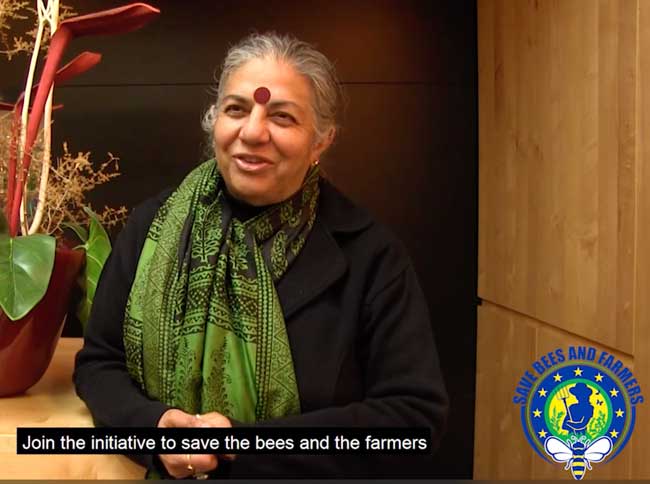
“Vandana Shiva supports our ECI” | Video | “We need to learn from tribals” >>
The “Save Bees and Farmers!” European Citizens’ Initiative alliance is a growing network of currently over 140 environmental NGOs, farmer and beekeeper organisations, charitable foundations and scientific institutions distributed throughout the European Union, working together to reconcile agriculture, health and biodiversity.
Source: The “Save Bees and Farmers!” European Citizens’ Initiative
URL: https://www.savebeesandfarmers.eu/eng/about-us/
Date visited: 4 August 2020
The role of bees in any economy is well understood, and the disappearance of indigenous bee populations is alarming to scientists all over the world:
Bees are some of nature’s most fascinating creatures, they are also incredibly important. Their intimate dependency relationship with plants makes bees a crucial component of successful ecosystems the world over. As primary producers, plants are fundamental to life. Plants provide the basis of the food chain for all creatures as well as providing shelter, protection and nesting sites. People utilise plant based natural resources for food, fuel, shelter, useful materials and commercial gain. Plants maintain watersheds, prevent soil erosion and are a factor in climatic stability. Pollination is therefore essential for agriculture and environmental management and a variety of pollinators are required to maintain reproduction across a broad spectrum of flowering plant species. In their turn the pollinators require protection of the plants on which their life depends and the habitats within which these plants grow. The greatest threat to pollinators is unrestrained habitat destruction, degradation or pollution.
Source: Bees for Development Trust (UK): “Conservation & environment”
URL: http://www.beesfordevelopment.org/categories/conservation-environment/
Date visited: 4 August 2020
[Bold typeface added above for emphasis]
The Scheduled Tribes and Other Traditional Forest Dwellers (Forest Rights Act) gives members of tribal communities the right “to collect, use, and dispose of minor forest produce including bamboo, brush wood, stumps, cane, tussar, cocoons, honey, wax, lac, tendu or kendu leaves, medicinal plants and herbs, roots, tubers.” – Azim Premji University Team
Learn from M S Swaminathan – a world renowned scientist – how biological diversity contributes to public health, people’s livelihood and environmental security in addition to food security: his call on fellow citizens to use and share resources in a more sustainable and equitable manner; outlining the long journey from the 1992 Earth Summit to a commitment to foster inherited knowledge through India’s Biodiversity Act and Genome Saviour Award; an award intended to reward those who are “primary conservers” – guardians of biological diversity!
More about the work of his foundation which “aims to accelerate use of modern science and technology for agricultural and rural development to improve lives and livelihoods of communities.” – www.mssrf.org | Regarding the issues of food security raised above, and the nutritional value of indigenous grains, seeds and millets, read an in-depth report that concludes that “the tribal food basket has always been diverse and nutritious” >>
Up-to-date reports by Indian experts and journalists
Search tips
Combine the name of any particular state, language or region with that of any tribal (Adivasi) community.
Add keywords of special interest (music, poetry, dance just as health, sacred grove and biodiversity); learn about the rights of Scheduled Tribes such as the “Forest Rights Act” (FRA); and the United Nations “Declaration on the Rights of Indigenous Peoples”, “Universal Declaration of Human Rights”, “women’s rights”, or “children’s right to education”.
Ask a question that includes “tribal” or “Adivasi”, for instance: “Adivasi way of life better?” (or “tribal way of life worse?”)
Specify any particular issue or news item (biodiversity, bonded labour and human trafficking, climate change, ecology, economic development, ethnobotany, ethnomedicine, global warming, hunter-gatherers in a particular region or state, prevention of rural poverty, water access).
For official figures include “scheduled tribe ST” along with a union state or region: e.g. “Chhattisgarh ST community”, “Himalayan tribe”, “Scheduled tribe Tamil Nadu census”, “ST Kerala census”, “Particularly Vulnerable Tribal Group Jharkhand”, “PVTG Rajasthan”, “Adivasi ST Kerala”, “Adibasi ST West Bengal” etc.
In case the Google Custom Search window is not displayed here try the following: (1) toggle between “Reader” and regular viewing; (2) in your browser’s Security settings select “Enable JavaScript” | More tips >>
Note: hyperlinks and quotes are meant for fact-checking and information purposes only | Disclaimer >>
List of websites covered by this Google custom search engine
Academia.edu (platform for academics to share research papers) – www.academia.edu
Archive.org – https://archive.org
Centre for Science and Environment – https://www.cseindia.org
Current Conservation – https://www.currentconservation.org
Development and Cooperation (D+C) https://www.dandc.eu
Down To Earth (India) – www.downtoearth.org.in
India Environment Portal – www.indiaenvironmentportal.org.in
Harnessing Nature Magazine – https://harnessingnature.online
Kalpavriksh Environmental Action Group – https://kalpavriksh.org
Mongabay-India – https://india.mongabay.com
M S Swaminathan Research Foundation – www.mssrf.org
Navdanya (protecting India’s biodiversity based food heritage) – https://navdanya.org
Third World Network (Penang, Malaysia) – https://twn.my
The Shola Trust (nature conservation in the Nilgiri region) – www.thesholatrust.org
WorldCat (“the world’s largest library catalog, helping you find library materials online”) – https://worldcat.org
Research the above issues with the help of Shodhganga: A reservoir of theses from universities all over India, made available under Open Access >>
Note: hyperlinks and quotes are meant for fact-checking and information purposes only | Disclaimer >>
